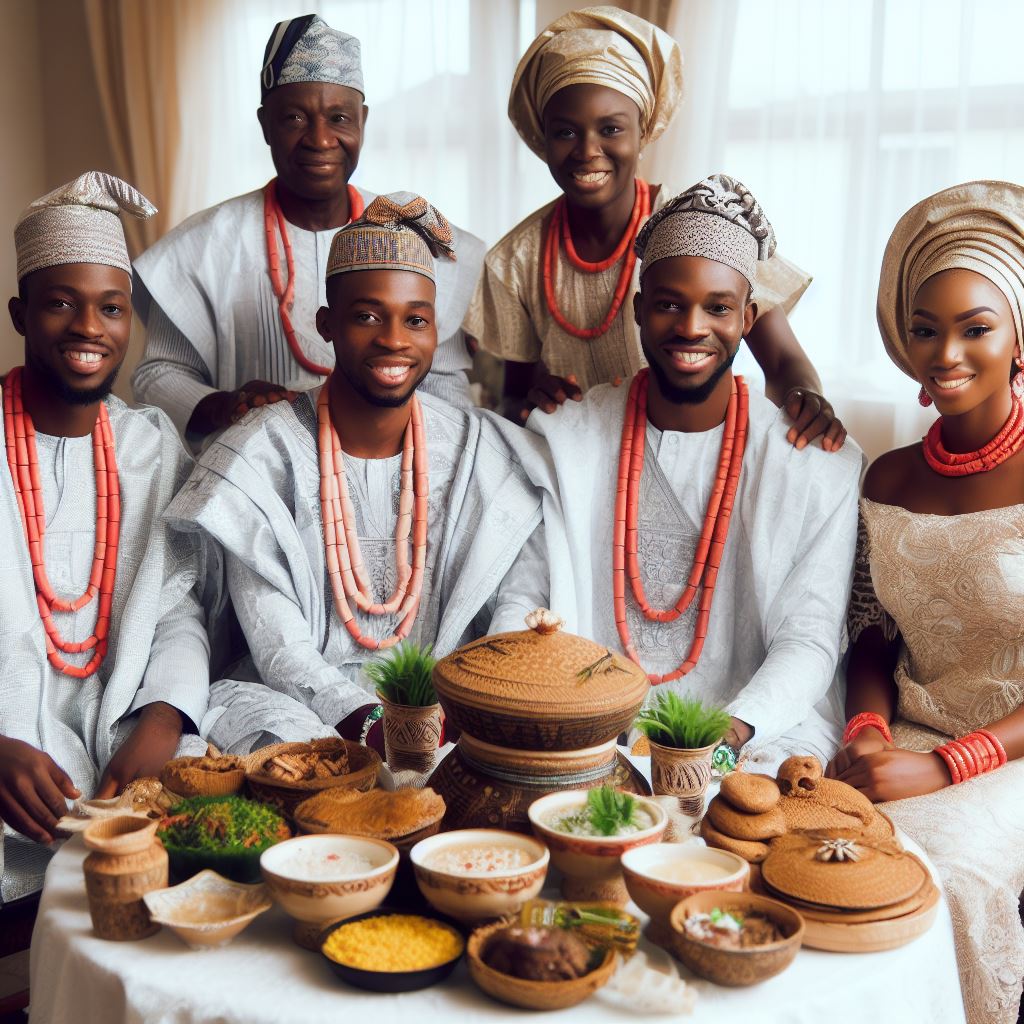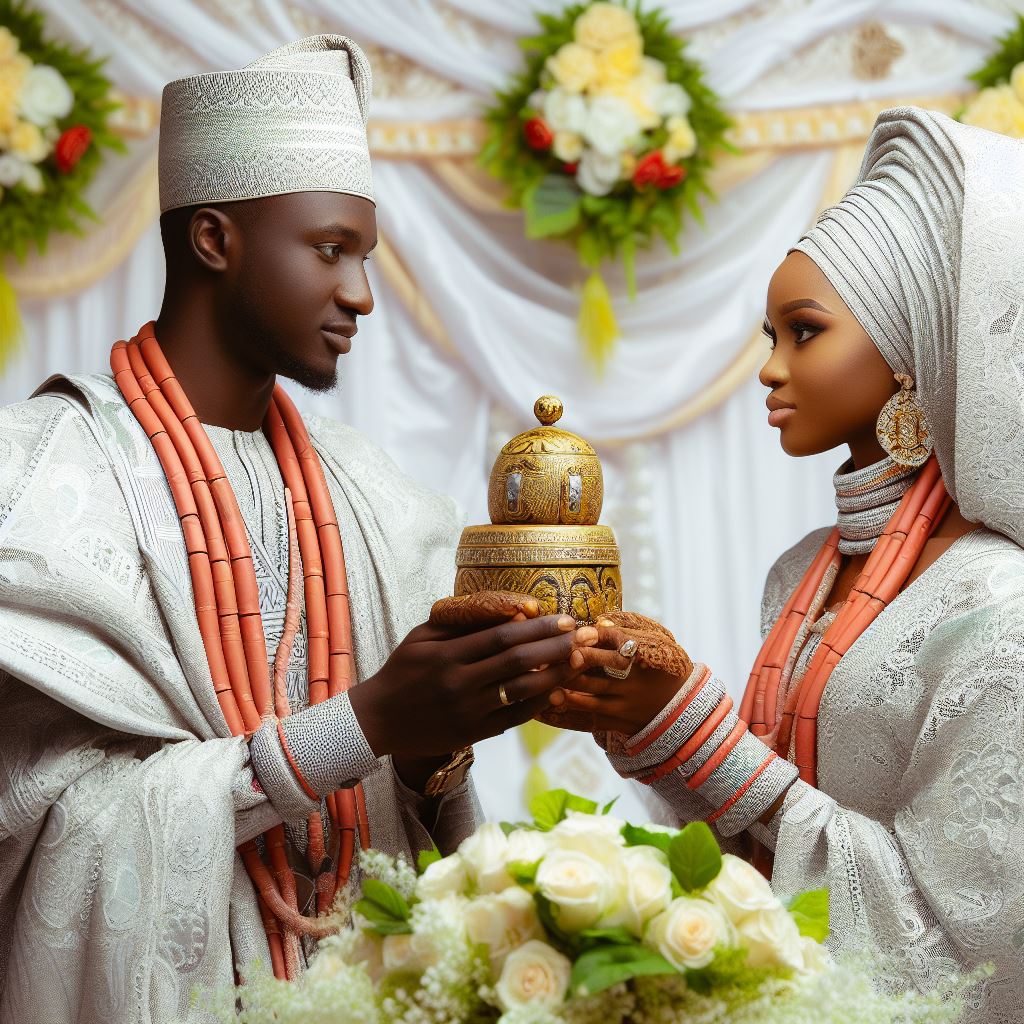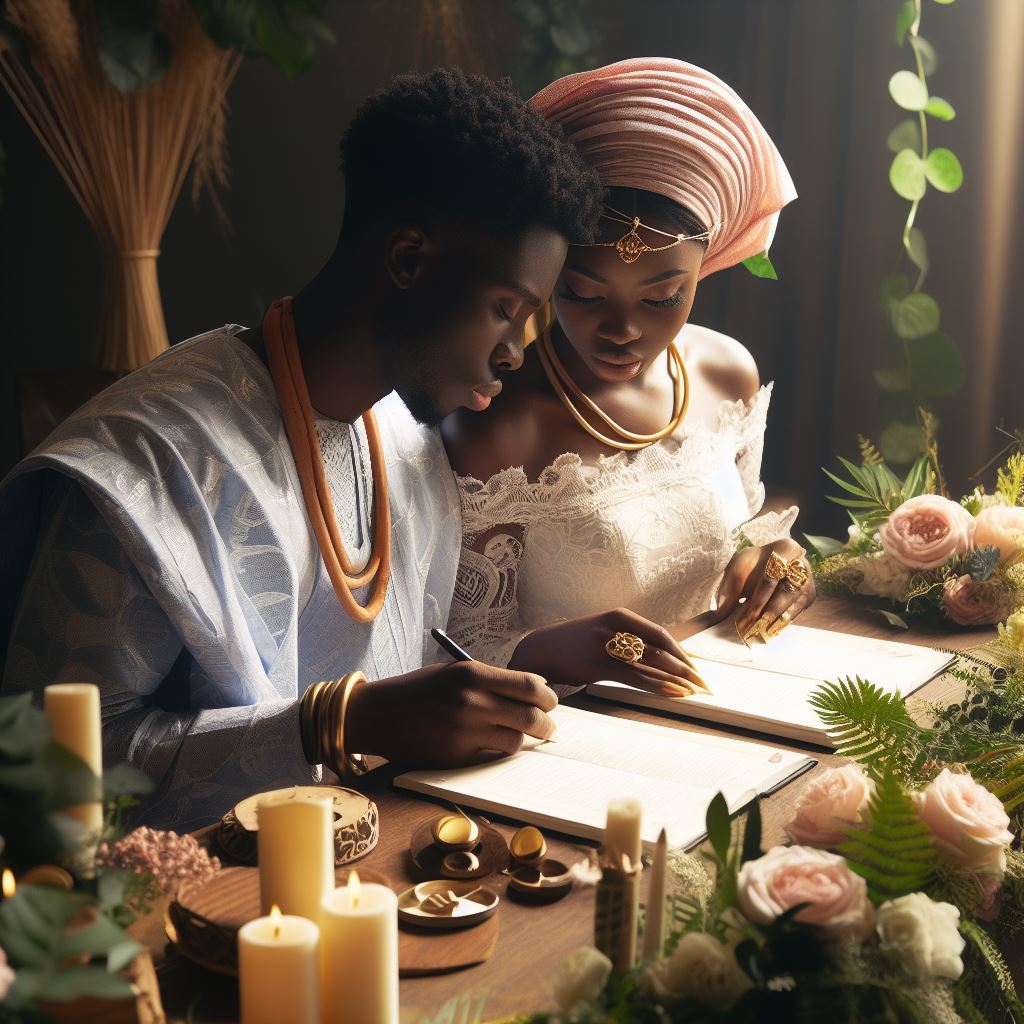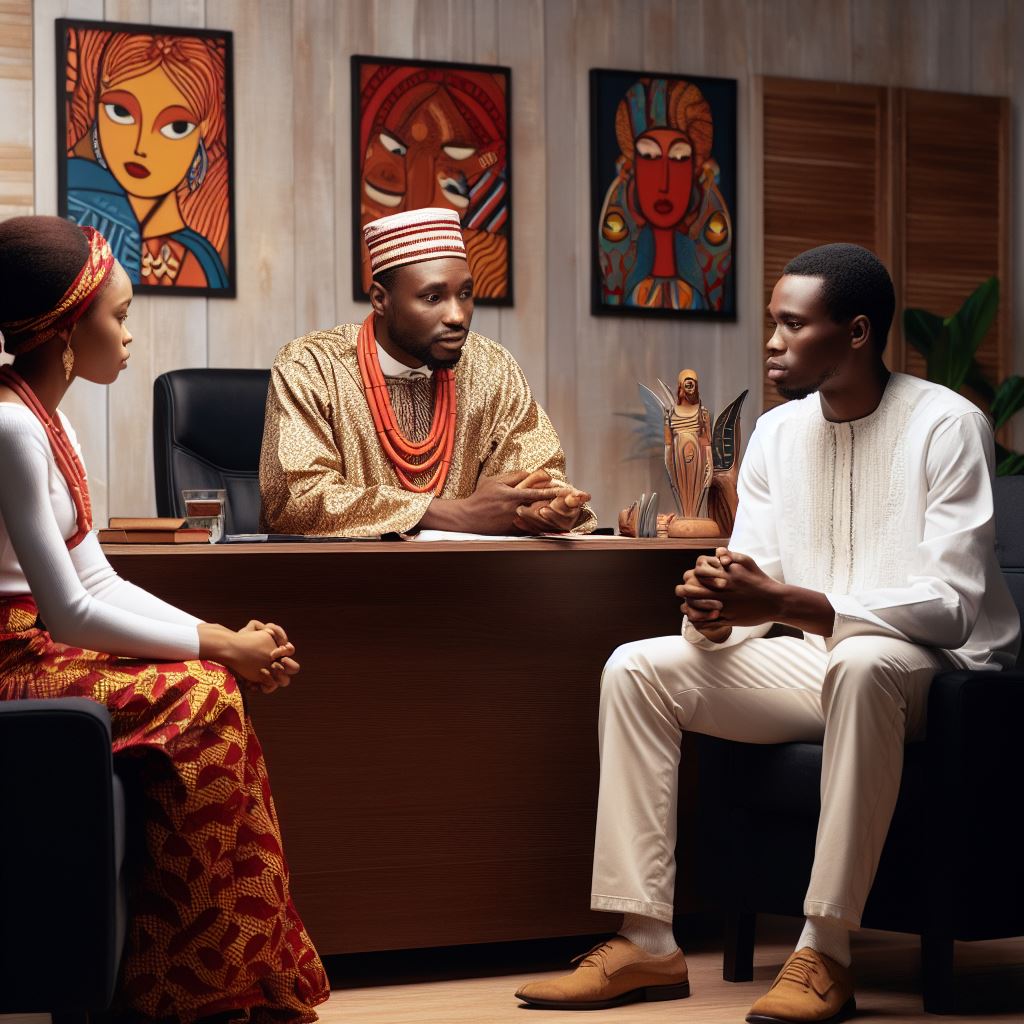Introduction
The evolution of marriage vows in modern Nigeria holds immense significance in Nigerian culture.
These vows have evolved over time, reflecting the changing values and beliefs of the society.
They shape the foundation of marital bonds and serve as a public declaration of commitment and love.
Delving deeper into this intriguing subject, we uncover fascinating insights into the rich history and cultural tapestry of Nigerian marriages.
Join us on this captivating journey through time and witness the transformation of marriage vows like never before.
Traditional Marriage Vows in Nigeria
Marriage in Nigeria is a profound cultural institution, woven with rich traditions and ceremonies that have evolved over centuries.
The heart of these nuptial traditions lies in the exchange of vows, a practice deeply rooted in the nation’s diverse ethnic groups.
A. Traditional Marriage Vows in Nigeria’s Past
In the past, traditional marriage vows in Nigeria were sacred and symbolic.
They symbolized unity, love, and respect, binding not only the couple but their families and communities.
These vows were recited in native languages, making them more intimate and culturally significant.
B. The Importance of Traditional Vows in Nigerian Culture
These vows hold immense importance in Nigerian culture and society.
They serve as a pledge to honor one’s heritage, uphold family values, and respect marital commitments.
Traditional vows also act as a reminder of the couple’s responsibilities in the community.
C. Examples of Traditional Marriage Vows by Ethnic Groups
- Yoruba: “Iyawo, I promise to love, cherish, and protect you. I will be your strength and your companion, now and forever.”
- Igbo: “Nne, Nna, I vow to stand by you in good and bad times, to provide, and to hold you dear till eternity.”
- Hausa: “Barka da zuwa gare ku, Ina son ku. Za mu taimaka mu yi baki daya. Insha Allah, I am yours.”
These are just a few examples, and there are countless variations depending on local customs.
D. The Role of Religion in Shaping Traditional Marriage Vows
Religion plays a significant role in shaping these vows.
In predominantly Christian areas, vows may include references to the Bible, while Islamic regions incorporate verses from the Quran.
These religious touches add a spiritual dimension to the promises, emphasizing divine blessings and guidance in the marital journey.
In a nutshell, traditional marriage vows in Nigeria are a testament to the country’s rich and diverse cultural heritage.
They are more than words; they are promises deeply rooted in history, tradition, and spirituality.
These vows continue to evolve, adapting to the modern world while remaining a cornerstone of Nigerian society, connecting generations and preserving a beautiful tapestry of tradition.
Read: Incorporating Personal Touches in Your Marriage Vows
Influence of Western Culture on Marriage Vows
A. Western Influence
Western culture has left an indelible mark on marriage vows in modern Nigeria.
Globalization and increased exposure to Western traditions have reshaped the way Nigerians pledge their love.
B. The Popularity of Western-Style Weddings
Western-style weddings and vows are gaining popularity, reflecting a fusion of cultures.
Many couples now opt for a mix of Western and traditional Nigerian ceremonies.
C. Changes in Vow Language, Content, and Format
- Language: English has become the primary language for vows. It’s often preferred for its universality.
- Content: Traditional vows emphasized commitment and respect; Western vows focus on love, partnership, and personal promises.
- Format: Western-style vows are usually shorter, more personal, and often follow the “I do” structure.
D. Examples of Western-Inspired Marriage Vows
- “I promise to stand by you in sickness and health, to love and cherish you all the days of my life.”
- “I take you to be my lawfully wedded wife/husband, to have and to hold from this day forward.”
- “With this ring, I thee wed, and all my worldly goods I share.”
Basically, the influence of Western culture on marriage vows in Nigeria is a testament to the evolving nature of traditions.
This fusion of cultures represents a beautiful blend of old and new, creating a unique and meaningful experience for Nigerian couples as they embark on their journey of love and commitment.
Read: Bridging Cultural Gaps: Counseling for Inter-Tribal Marriages

Incorporation of Personalized Vows
In recent years, there has been a notable trend in Nigeria where couples are incorporating personalized vows into their wedding ceremonies.
This shift in wedding traditions reflects a broader global movement towards individualism and self-expression in matrimony.
A. Exploring the Trend
- Expressing Unique Stories: Couples now seize the opportunity to tell their unique love stories. They describe how they met, their journey, and the deep emotions that bind them together.
- Embracing Cultural Diversity: Nigeria’s diverse ethnic groups bring a rich tapestry of traditions, which are now weaved into personalized vows. These vows often reflect the cultural roots of the couple, making the ceremony richer in tradition.
- Encouraging Emotional Connection: Personalized vows allow couples to express their deep emotional connection and commitment. This authenticity brings sincerity and depth to the ceremony.
B. Reasons Behind the Shift
- Individualism: The trend towards personalized vows in Nigeria aligns with a growing sense of individualism.
Couples want their wedding ceremonies to reflect their unique personalities and experiences. - Self-Expression: In a rapidly changing world, the desire for self-expression is becoming more pronounced. Personalized vows provide a platform for couples to express their love in their own words.
- Modern Communication: The digital age has changed how we communicate, making it easier for couples to share their vows with a wider audience. Social media has played a significant role in this trend.
C. Examples of Personalized Vows
- Ada and Emeka: Ada, of the Igbo ethnic group, spoke of their love’s journey, from a chance meeting at a cultural festival to the deep bond they’ve built. Emeka, a Yoruba, added verses in his native tongue to honor their cultural diversity.
- Amina and Abdul: Amina, a Muslim, and Abdul, a Christian, incorporated verses from both the Quran and the Bible, symbolizing their interfaith union. Their vows underscored the message of love transcending religious boundaries.
Significance in Modern Nigerian Weddings
The incorporation of personalized vows into Nigerian weddings enhances the depth and individuality of the ceremonies.
These vows offer a glimpse into the couple’s love story and their shared vision for the future.
They also embrace Nigeria’s rich cultural tapestry and showcase the couple’s commitment to forging a unique, enduring bond in a rapidly changing world.
In essence, the shift towards personalized vows in Nigeria signifies a beautiful evolution in the country’s wedding traditions.
It’s a testament to the enduring power of love and the importance of expressing it in one’s own words.
Read: Marriage Life: Tips for Harmonious Living in Nigeria
The Role of Social Media and Technology
A. Impact of Social Media and Technology
In modern Nigeria, the evolution of marriage vows is profoundly influenced by social media and technology.
Couples now have access to a vast array of vows, thanks to the internet’s treasure trove of cultural diversity.
B. Personalization of Vows
They can seamlessly craft and personalize their vows, blending traditions from different cultures.
This fusion results in uniquely tailored expressions of love and commitment.
C. Showcasing on Social Media
Social media platforms, such as Instagram and Pinterest, have become powerful tools for showcasing these creative marriage vows.
Couples share their special moments, inspiring others and fostering a sense of community.
D. Pros and Cons of Technology
However, while technology enhances the vow creation process, it comes with pros and cons.
Pros:
- Accessibility: Couples can easily access a wide variety of vow samples and templates.
- Inspiration: Technology serves as a wellspring of inspiration, helping couples find the perfect words.
- Documentation: Digital vows can be easily stored, ensuring they’re never lost.
Cons:
- Authenticity: There’s a risk of vows feeling less authentic when borrowed from the internet.
- Overwhelm: The sheer volume of choices can be overwhelming, making it challenging to select the right vows.
- Privacy: Sharing intimate vows on social media can jeopardize privacy.
All in all, social media and technology have revolutionized the crafting and sharing of marriage vows in Nigeria.
Couples now have a wealth of resources at their fingertips, making it easier than ever to create vows that reflect their unique love stories.
While technology offers incredible benefits, it’s essential for couples to strike a balance between the virtual and the real to ensure their vows remain deeply personal and intimate.
Read: Addressing Common Marital Issues in the Nigerian Context
Learn More: Celebrating Love: Stories Behind Famous Nigerian Toasts
Conclusion
The evolution of marriage vows in modern Nigeria reflects the changing societal norms and values.
The traditional vows have gradually been adapted to reflect individuality, commitment, and equality within marriages.
This shift in marriage vows has had a significant impact on the institution of marriage in Nigeria.
It has allowed couples to express their love and commitment in their own unique way, while still preserving the cultural and emotional aspects of Nigerian weddings.
Furthermore, this evolution of marriage vows prompts us to reflect on our own views and experiences with marriage vows.
It challenges us to consider the meaning and significance we attribute to these promises and how they shape our relationships.
As we explore the changing landscape of marriage vows, it is important for each individual to embrace their own values and beliefs.
Whether traditional or modern, marriage vows hold a profound significance in the union of two individuals and should be approached with thoughtfulness and sincerity.
Therefore, the continued preservation and adaptation of marriage vows in modern Nigeria is vital in maintaining the cultural and emotional essence of Nigerian weddings.
It is through these vows that couples, families, and communities come together to celebrate love, commitment, and unity.
So, what does your marriage vow mean to you?




